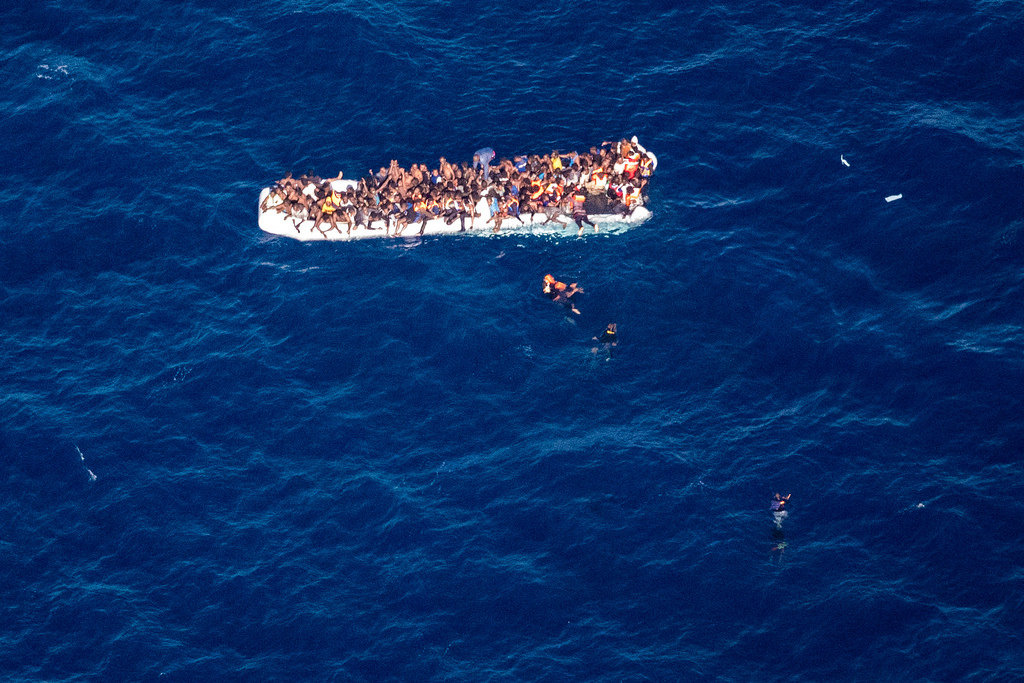- About
- Topics
- Picks
- Audio
- Story
- In-Depth
- Opinion
- News
- Donate
-
Signup for our newsletterOur Editors' Best Picks.Send
Read, Debate: Engage.
| February 24, 2020 | |
|---|---|
| topic: | Refugees and Asylum |
| tags: | #human rights, #immigration, #Italy, #Canzionere Grecanico Salentino, #refugees |
| partner: | Greedy for Best Music |
| located: | Italy |
| by: | Lev Nordstrom |
The tarantella/taranta, for instance, is a lively, percussion-driven folk dance and music style in 6/8 time, originating from southern Italy. Accompanied by frenzied dancing, it was believed to be an antidote to the venomous bite of a tarantula spider.
Belonging to the broader musical family of tarantella is the pizzica, still popular in Apulia and regions such as Calabria and Basilicata and is performed by groups such as the Lecce-based formation Canzoniere Grecanico Salentino (CGS). The seven-piece traditional music ensemble was founded by Rina Durante back in 1975 and has since recorded 19 albums. In 2007, violinist and percussionist Mauro Durante followed in his father Daniele's footsteps as band leader, in 2010 the group was named "Best Italian World Music Band" at the Meeting of Independent Labels (MEI) and in 2018 awarded “Best Group” at the Songlines Music Awards.
CGS are considered the most important Salento folk music group, "reinterpreting in a modern key the traditions revolving around the ritual 'tarica pizzica,' which had the power to cure through music, trance and dance," their website reads. Over the course of their storied career CGS have continued to innovate and represent Italian music at home and abroad. They have performed in the US, Canada, Europe and the Middle East alongside internationally renowned artists such as Ludovico Einaudi (Taranta Project), Piers Faccini, Ballaké Sissoko, Ibrahim Maalouf, Fanfara Tirana or Stewart Copeland of the Police and even opened the annual Concertone della Notte della Taranta festival in Melpignano for an audience of over 100,000 people.
In the summer of 2014, CGS released a remarkable music video to a song entitled "Solo Andata” (transl. “One Way”), its poignant lyrics based on a poem by renowned Italian novelist, poet and screenwriter Erri De Luca, who even makes a guest appearance in the clip. Deeply moved, we decided to reach out to Mauro Durante, to find out more about this remarkable project and how it came about. He happily obliged:
"The 'Solo Andata' project is a tale of meetings. Everything, from the music to the video, was shaped by beautiful encounters. Gabriella Della Monaca, a journalist from Puglia, was a sort of engine for this project. She used to invite Erri De Luca to present his books in Salento and became his friend. She arranged the encounter between him and my father Daniele. They liked each other, and my father offered to create the music for this beautiful poem, part of [Erri's] book 'Solo Andata'. [My father and I] composed the music together and I wrote the arrangement myself, involving all the musicians of Canzoniere. Erri listened to the song and loved it. Gabriella eventually paved the way for a video clip and another encounter: this time, with the director and famous Italian actor Alessandro Gassmann. He wrote the script and filmed it on a beautiful beach in Salento. Amnesty International heard of the project and became a part of it, recognising us with their 'Arts and Human Rights' Award. We then went on a 'Solo Andata' tour with Erri De Luca. As you can see, it's the tale of many meaningful and beautiful meetings.”
The video to “Solo Andata” shows a fisherman headed for the beach. He finds a spot and, after finishing his cigarette, casts a glance into his wallet, revealing a black-and-white photograph of a woman, standing on a dock, her few belongings in bundles by her side, smiling. He casts his line and waits, watching the waves as they hit the shore. When all of a sudden he sees people emerging from the water, trying to reach the land. They do, running past him, but one person seems to be in trouble. A person resembling the woman on the photograph in his wallet.
We asked Mauro Durante about the project’s underlying message. “We are all migrants,” he promptly replied and then went on to add: “We hear too many speeches of hatred, fear and ignorance. Politicians make profit out of those feelings. We can’t lose touch with our human nature. These people need to be saved, they need to be helped. There’s no other way to deal with this situation. How can politicians even talk of an 'emergency', when this has been going on continuously for 20 years? They just can't manage the 'ordinary'. These people are forced to leave their countries, and we, Italian people, [seem to forget that our own history was shaped] by heavy emigration. I really hope we can face the situation as a whole, as the community we claim ourselves to be… the EU. I believe in the power of a united, strong community. And I see many people around me that share the same beliefs and desire.”
The project is a powerful tribute to ‘the uncountable’, who lost their lives in the ongoing refugee crisis. Its lyrics reveal a haunting truth, a message that “deserves to be heard,” says Mauro Durante. Sadly, the situation today remains unchanged and Erri De Luca’s words in “Solo Andata” as relevant as ever:
“Embraced by the Mediterranean, migrants from Africa and the East sink into the hollow between waves. The sack of seeds brought from home goes scattered through seaweed and hair. Dry land in Italy is a land locked down. We let them drown, to drown them out.”
By copying the embed code below, you agree to adhere to our republishing guidelines.
